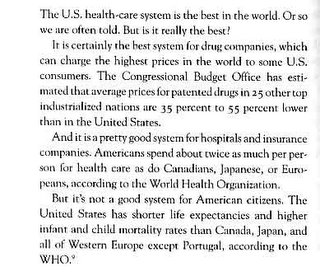


Dr. Peter Rose, vice president of marketing for Pfizer one of the largest drug companies in the world, wrote an article in the Los Angeles Times. The article at the top of this blog appeared five days after Christmas in 2004.
Dr. Rost was fired in December of 2005.
Public Citzen online said this about drug profits:
"...drug price surveys have found that the prices charged to Medicare beneficiaries without drug coverage are nearly double 98% more the most favored customer price. If the Medicare program were to get the same price discount that the Veterans Department receives, the price of drugs to uninsured Medicare beneficiaries could be cut nearly in half based on the state survey results. Such a price cut would make Medicare drug coverage much more affordable for taxpayers and substantially reduce any out-of-pocket costs for beneficiaries. Medicare beneficiaries constitute a far larger purchasing block than any current customer receiving most favored prices from drug companies."
The prescription drug bill supported by the White House and the GOP -- that passed into law not too long ago -- is really of much more benefit to the pharma-corporations than to those needing the drugs. The bill was largely written by these corporations--a common practice under the Bush White House. Another instance: Enron (before its collapse) and other energy corporations writing the energy U.S. energy policy for Bush. If this administration were really interested in the American public that would have had the program run by the government, which could then negotiate with the companies as is done in the Veterans' Administration health program.
Here is a report from the Center for Public Integrity, a respected and carefully run non-profit watchdog organization:
http://www.publicintegrity.org/rx/report.aspx?aid=723
"The Center reviewed the 1,600 plus bills the top 20 drug corporations and PhRMA and BIO lobbied. Sponsors of more than 50 percent of those bills had one or more former staff members representing the industry. A few of the sponsors have gone on to become lobbyists themselves.
"By adding the benefit to Medicare, the government program that provides health insurance to some 41 million people, the industry found a reliable purchaser for its products. Thanks to a provision in the law for which the industry lobbied, government programs like Medicare are barred from negotiating with companies for lower prices.
"Critics charge that the prescription drug benefit will transfer wealth from taxpayers, who provide the funding for Medicare, to pharmaceutical firms. According to a study done in October 2003 by Boston University professors Alan Sager and Deborah Socolar, 61 percent of Medicare money spent on prescription drugs will become profit for drug companies. Drug-makers will receive $139 billion in increased profits over eight years, the study predicts. The Medicare prescription drug benefit starts in 2006"
We have been told by the pharma spinmeisters that these large drug companies need high profits to do their R & D (Research and Development) programs.
These statements to say the least are --- less than disingenuous.
Here is some information from an authoritative site in India:
http://www.frontlineonnet.com/fl2116/stories/20040813003210400.htm
"INCREASINGLY, more and more resources that could otherwise go to corporate R&D are being funnelled into pay packages for the top layers of the pharmaceutical industry. Here are the total pay packages for the chief executive officers of the top five pharmaceutical corporations in the world:
Pfizer: Hank McKinnell, total annual pay package: $28 million, plus $30.6 million in unexercised stock options;
Merck: Raymond Gilmartin: $ 19.5 million, plus $48 million in unexercised stock options;
Bristol Myer Squibb: PR Dolan, $8.5 million, plus $3.4 million in unexercised stock options;
Glaxo Smith-Kline: Jean Pierre Garnier, $11.8 million; and
Du Pont EI: Charles O. Holliday, $13.5 million."
And, some more information from another hard hitting investigative site:
http://zmagsite.zmag.org/Apr2003/yvesengler0403.html
"Pharmaceutical companies constantly argue they need these strong patent protections due to the high cost of developing new drugs. Yet, the same UQAM study cited earlier found that the nine largest multinational pharmaceutical companies spent US$316 billion on marketing and administration, while spending only $113 billion on research and development. Thus major pharmaceutical companies spend $2.80 on promotion and administration of their drugs for every $1 they spend on bringing new drugs to the market."

